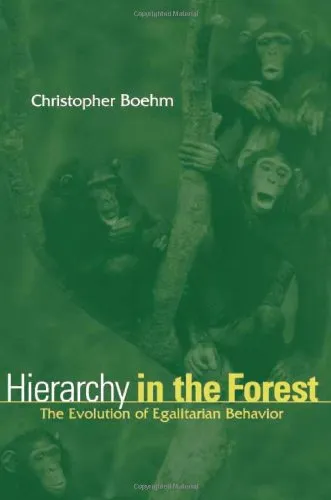Hierarchy in the Forest: The Evolution of Egalitarian Behavior
4.5
Reviews from our users

You Can Ask your questions from this book's AI after Login
Each download or ask from book AI costs 2 points. To earn more free points, please visit the Points Guide Page and complete some valuable actions.Related Refrences:
Introduction to "Hierarchy in the Forest: The Evolution of Egalitarian Behavior"
In "Hierarchy in the Forest: The Evolution of Egalitarian Behavior," Christopher Boehm embarks on a captivating exploration of human social structures, particularly the origins and development of egalitarian societies. This book deftly blends anthropology, evolutionary biology, and political theory to unpack how humans have navigated between hierarchical and egalitarian modes of living throughout their evolutionary journey. As we delve into the intricacies of human social organization, we gain insights into what it means to cooperate, share, and lead in our complex societies.
Detailed Summary of the Book
Egalitarian societies are a fascinating paradox within the broader context of evolutionary biology, where competition often dictates survival. Boehm's work investigates this paradox by studying both contemporary and ancient hunter-gatherer groups, drawing connections between their societal structures and our ancestral past. He posits that the roots of egalitarian behavior can be traced back to moments when groups of humans consciously suppressed aggression and hierarchical dominance to foster more cooperative environments.
Through meticulous research and comparative analysis, Boehm illustrates how human groups have historically oscillated between hierarchical and egalitarian structures based on environmental and social pressures. The book carefully traces how these shifts occurred, highlighting the innate human capacity to adapt social structures for collective benefit. By exploring infrapolitics and the balance of power in these societies, Boehm argues for the evolutionary benefits of egalitarian behaviors.
Key Takeaways
- Human societies have evolved complex mechanisms to ensure equitable resource distribution and power sharing.
- Egalitarian behavior is not an anomaly but a recurring pattern that has emerged under specific ecological and societal conditions.
- Hierarchy and egalitarianism are not mutually exclusive; they coexist within human social systems, continuously influencing each other.
- The suppression of alpha behaviors in groups is a conscious cultural adaptation facilitated by collective enforcement of norms.
Famous Quotes from the Book
"Egalitarianism is a complex social contract; it requires constant vigilance and active participation from all group members."
"The tendency to form hierarchies is deeply rooted, but so is the countertendency to build societies that limit dominance."
Why This Book Matters
Christopher Boehm's book is crucial for understanding the underpinnings of human cooperation and leadership in contemporary societies. As modern civilization grapples with issues of inequality, governance, and justice, "Hierarchy in the Forest" offers a framework for examining how and why equitable societies can arise. By studying the evolution of egalitarian behavior, readers can better appreciate the potential for fostering more balanced and equitable social systems today.
The book challenges perennial assumptions about the inevitability of hierarchical dominance structures, offering hope and evidence that societies can, indeed, operate on egalitarian principles. For policymakers, educators, and anyone interested in the dynamics of power and equality, Boehm's insights provide critical perspectives needed to address the social challenges of our time.
Free Direct Download
You Can Download this book after Login
Accessing books through legal platforms and public libraries not only supports the rights of authors and publishers but also contributes to the sustainability of reading culture. Before downloading, please take a moment to consider these options.
Find this book on other platforms:
WorldCat helps you find books in libraries worldwide.
See ratings, reviews, and discussions on Goodreads.
Find and buy rare or used books on AbeBooks.
1462
بازدید4.5
امتیاز0
نظر98%
رضایتReviews:
4.5
Based on 0 users review
Questions & Answers
Ask questions about this book or help others by answering
No questions yet. Be the first to ask!














